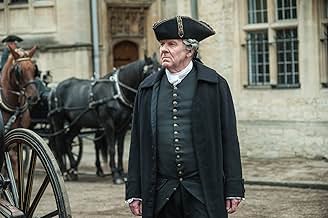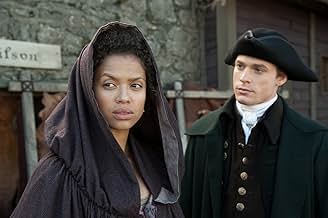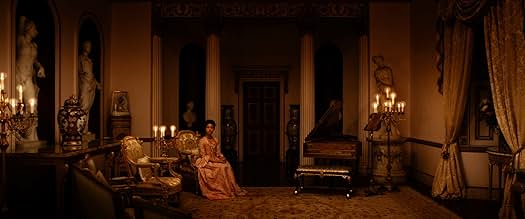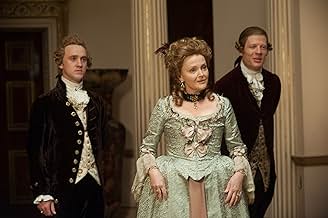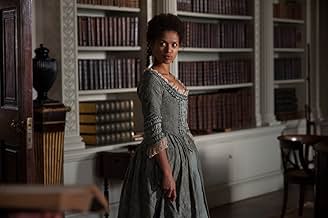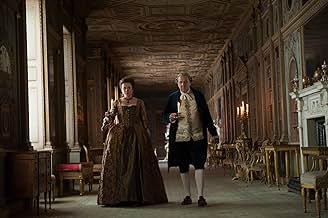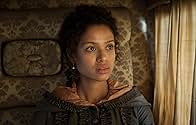Belle
- 2013
- Tous publics
- 1h 40min
La fille métisse, Dido Elizabeth Belle, du capitaine de la Royal Navy Sir John Lindsay, est élevée par le grand-oncle aristocratique Lord William Murray, comte de Mansfield dans l'Angleterre... Tout lireLa fille métisse, Dido Elizabeth Belle, du capitaine de la Royal Navy Sir John Lindsay, est élevée par le grand-oncle aristocratique Lord William Murray, comte de Mansfield dans l'Angleterre du 18e siècle.La fille métisse, Dido Elizabeth Belle, du capitaine de la Royal Navy Sir John Lindsay, est élevée par le grand-oncle aristocratique Lord William Murray, comte de Mansfield dans l'Angleterre du 18e siècle.
- Récompenses
- 13 victoires et 32 nominations au total
Avis à la une
In years hence, audiences will be able to point to this film, as the moment the world knew Gugu Mbatha-Raw was going to be big. Belle is Amma Asante's feature-length directorial debut, and her work here is astonishingly confident. Tackling a period piece may seem daunting to most, but in Asante's case, she has the benefit of a top-notch cast, and a truly fascinating story. Loosely based on the story of Dido Elizabeth Belle, Dido was the daughter of an enslaved African woman and an English admiral.
As the film begins, although she is born illegitimate, Dido's father (Matthew Goode, Stoker) gives her over into the care of his great-uncle, William Murray, the first Earl of Mansfield (Tom Wilkinson), who acts as the Lord Chief Justice of the British courts. As she grows into a young woman, Dido's life at the palatial estate of Kenwood is full of mixed blessings. While her uncle and aunt (Emily Watson, Breaking the Waves) treat her as if she were their own—they raise her alongside their other niece, Elizabeth Murray (Sarah Gadon, A Dangerous Method)—social conventions of eighteenth century society are immovable; no matter how much they love her, Dido feels the sting of being forced to eat with the servants, when company comes calling.
The greatness of the film comes in its intricate plotting, and in the parallels drawn between gender and race. Author Jane Austen dealt with the position of women in English society through the use of dry humor—though the rage at a young woman being forced into marriage in order to secure a safe future was always very much present. In Belle however, there is no satire to soften the blow. As Elizabeth comes out, venturing to London in search of a husband, she points out to Belle the inherent unfairness of a system that allows women to be treated as male property. Dido doesn't necessarily have the problem of a search for a husband, as the inheritance of her father's fortune ensures that she is financially secure; but for a radiant young woman in the prime of her life, her uncle's insistence on keeping her out of sight understandably rankles her.
Matters are complicated by the arrival of John Davinier (Sam Reid), the son of a local clergyman. Ambitious and wide-eyed, John wants to try to rise in station, training with Lord Mansfied to become a lawyer. His outspoken, radically abolitionist views on a notorious legal case Lord Mansfield is trying annoy the Lord considerably; but he rouses all the passionate feeling in Dido that she has been forced for so long to suppress.
As Lord Mansfield, Wilkinson (Batman Begins, Michael Clayton) plays the exasperated father figure with the correct touches of humor and warmth. As a judge, he projects the inner conflicts of a man with the weight of the entire economic system on his shoulders; you can see him try to deflect from the strong-arming of local politicians, who want to ensure that the presence of the "mulatto" in his house will not affect his ruling on the case. As Elizabeth, Gadon takes what could have been a very stereotypical role of the flighty, romantic English girl, and brings a deep sense of hurt to it. Having been left with her uncle after her new stepmother successfully wrote her out of her father's will, Elizabeth's cheery exterior hides an emotionally hurt young girl.
And finally, there is Mbatha-Raw. As Dido, the engine that drives the film, you may deeply feel her two-fold frustration as a woman, and as a person of color. You will be carried away by her passion—her belief that things should not remain the same. On a more general level, the camera absolutely adores her. She moves and projects with a vitality and ease that forces one to stop at several points. Her characterization and her performance are so accomplished, that her independent-minded heroine could stand toe-to-toe with the multiple incarnations of Jane Austen's Elizabeth Bennett. If Belle is any indication, and if there is any fairness in this world, there should be more great things to come from her.
-Nick Kostopoulos - See more at: http://www.mediumraretv.org
As the film begins, although she is born illegitimate, Dido's father (Matthew Goode, Stoker) gives her over into the care of his great-uncle, William Murray, the first Earl of Mansfield (Tom Wilkinson), who acts as the Lord Chief Justice of the British courts. As she grows into a young woman, Dido's life at the palatial estate of Kenwood is full of mixed blessings. While her uncle and aunt (Emily Watson, Breaking the Waves) treat her as if she were their own—they raise her alongside their other niece, Elizabeth Murray (Sarah Gadon, A Dangerous Method)—social conventions of eighteenth century society are immovable; no matter how much they love her, Dido feels the sting of being forced to eat with the servants, when company comes calling.
The greatness of the film comes in its intricate plotting, and in the parallels drawn between gender and race. Author Jane Austen dealt with the position of women in English society through the use of dry humor—though the rage at a young woman being forced into marriage in order to secure a safe future was always very much present. In Belle however, there is no satire to soften the blow. As Elizabeth comes out, venturing to London in search of a husband, she points out to Belle the inherent unfairness of a system that allows women to be treated as male property. Dido doesn't necessarily have the problem of a search for a husband, as the inheritance of her father's fortune ensures that she is financially secure; but for a radiant young woman in the prime of her life, her uncle's insistence on keeping her out of sight understandably rankles her.
Matters are complicated by the arrival of John Davinier (Sam Reid), the son of a local clergyman. Ambitious and wide-eyed, John wants to try to rise in station, training with Lord Mansfied to become a lawyer. His outspoken, radically abolitionist views on a notorious legal case Lord Mansfield is trying annoy the Lord considerably; but he rouses all the passionate feeling in Dido that she has been forced for so long to suppress.
As Lord Mansfield, Wilkinson (Batman Begins, Michael Clayton) plays the exasperated father figure with the correct touches of humor and warmth. As a judge, he projects the inner conflicts of a man with the weight of the entire economic system on his shoulders; you can see him try to deflect from the strong-arming of local politicians, who want to ensure that the presence of the "mulatto" in his house will not affect his ruling on the case. As Elizabeth, Gadon takes what could have been a very stereotypical role of the flighty, romantic English girl, and brings a deep sense of hurt to it. Having been left with her uncle after her new stepmother successfully wrote her out of her father's will, Elizabeth's cheery exterior hides an emotionally hurt young girl.
And finally, there is Mbatha-Raw. As Dido, the engine that drives the film, you may deeply feel her two-fold frustration as a woman, and as a person of color. You will be carried away by her passion—her belief that things should not remain the same. On a more general level, the camera absolutely adores her. She moves and projects with a vitality and ease that forces one to stop at several points. Her characterization and her performance are so accomplished, that her independent-minded heroine could stand toe-to-toe with the multiple incarnations of Jane Austen's Elizabeth Bennett. If Belle is any indication, and if there is any fairness in this world, there should be more great things to come from her.
-Nick Kostopoulos - See more at: http://www.mediumraretv.org
- A love story and the value of being honest to yourself is what Belle is about. This movie transports you to the 1700s England. Based on the true story of Dido Elizabeth Belle "Belle", this tale is about a young mulato girl named Belle that is brought into her father's house and caretaker of her great-uncle Lord Mansfield a honorable Chief Judge and wife. Belle has all the rights and privileges of upper society but her face reflects her slave mother and the prevailing social prejudice keeps her from being totally accepted into the formal social circles. At the same time, she befriends her cousin, who she considers a sister and is also given residence to this estate after her mother dies and her father abandons her. This story is beautifully layered with the issues of equality and slavery but is not preachy. It merely shows how the matters of the heart can't be prevented by the color of your skin. This coming of age story is masterfully told. I saw this film as part of the Atlanta Film Festival.
Initially I was excited to see this movie because of Matthew Goode, even though I realized that he only plays a minor role in this film. After seeing the trailer however, the film flew towards the top of my "to watch" list. It still managed to exceed my expectations - interesting, well paced storyline, incredible cast (Tom Wilkinson was absolutely brilliant), intricate and beautiful costumes - definitely a movie that will be enjoyed even by those who are not big fans of period pieces.
The fact that the movie was based on a true story just made it even more impactful. Dido Elizabeth Belle is left in England by her loving Admiral father, to be raised by her aristocratic aunt and uncle - at a time in history when wealth and social standing could not overshadow the fact that she was a mixed race, illegitimate child. Belle's story of trying to figure out her place in the world and in her family unravels beautifully alongside a closer and deeper look at the racism and sexism plaguing the British society at the time. Add a dash of romance and the result is a beautiful film definitely worth watching.
The fact that the movie was based on a true story just made it even more impactful. Dido Elizabeth Belle is left in England by her loving Admiral father, to be raised by her aristocratic aunt and uncle - at a time in history when wealth and social standing could not overshadow the fact that she was a mixed race, illegitimate child. Belle's story of trying to figure out her place in the world and in her family unravels beautifully alongside a closer and deeper look at the racism and sexism plaguing the British society at the time. Add a dash of romance and the result is a beautiful film definitely worth watching.
I saw this film at the San Francisco International Film Festival. I don't usually see two films in one day and was tired after already seeing another film, but Belle woke me up. I really enjoyed it.
This film would have been OK as a total fiction but given that it was based on a true story, I found it fascinating. Set in England in the late 1700's, it shows the impact of the slave trade on society. The patriarch of the family is a justice of the High Court of England and takes on an important case regarding a slave trading ship while confronting the reality of limitations faced by his mulatto niece. It shows that when someone becomes part of your family, and you love that person, it changes your perspective on cultural norms. This film has prompted me to look into the history of the actual legal case involved.
The film also showed the similarities between his white and mulatto nieces: as women both had a price on their heads and suffered due to their "place" in that society beneath men... This film showed that while much has changed, many attitudes have not changed in 300 years... The two brothers who court the nieces could have come from any current film if they just updated their styles of clothes, hair, and accents.
This film would have been OK as a total fiction but given that it was based on a true story, I found it fascinating. Set in England in the late 1700's, it shows the impact of the slave trade on society. The patriarch of the family is a justice of the High Court of England and takes on an important case regarding a slave trading ship while confronting the reality of limitations faced by his mulatto niece. It shows that when someone becomes part of your family, and you love that person, it changes your perspective on cultural norms. This film has prompted me to look into the history of the actual legal case involved.
The film also showed the similarities between his white and mulatto nieces: as women both had a price on their heads and suffered due to their "place" in that society beneath men... This film showed that while much has changed, many attitudes have not changed in 300 years... The two brothers who court the nieces could have come from any current film if they just updated their styles of clothes, hair, and accents.
I'm a film lover who's encouraged to see a story that reveals a piece of the history so often ignored. "Belle" is based on a true story. Since the history of slavery is not taught, films that deal with it - when done well - can be not only entertaining but also instructive. We need these stories! "Belle" is surprising, a piece in the grand puzzle of the history of the slave trade and its impact on the lives of all manner of people. Tom Wilkinson is as always wonderful... The other actors are all just fine. Gugu is lovely as Dido. The hypocrisy of the British upper class is on full display. The Zong Slave ship case is threaded through this film and opens another door on the horrors of the slave trade. That case alone deserves its own film but it would probably be too horrible to watch! I was reminded of all the pained experiences black children endured as they attempted to integrate public schools. The insults and denigration, the racist assumptions hurled at these students were nightmarish. Being the only black person in a sea of whites to this day can be challenging. "Belle" allows us to see and to imagine what that was like in England in the late 1700's. "Belle" was a blood relative and still she could not sit at the dinner table if guests were dining. There's much to learn here, much to think about.
Le saviez-vous
- AnecdotesIn real life, Lady Elizabeth Murray married first to George Finch-Hatton, 10th Earl of Winchilsea. Their great-grandson was Denys Finch Hatton, who was played by Robert Redford in Out of Africa - Souvenirs d'Afrique (1985).
- GaffesEngagement rings were not used in the late 1700s. They didn't emerge until the 1920s.
- Citations
Dido Elizabeth Belle: My greatest misfortune would be to marry into a family who would carry me as their shame.
- ConnexionsFeatured in Belle: The Story (2014)
- Bandes originalesPiano Suite in G Minor, HWV 439, Allemande
Composed by George Frideric Handel
Meilleurs choix
Connectez-vous pour évaluer et suivre la liste de favoris afin de recevoir des recommandations personnalisées
- How long is Belle?Alimenté par Alexa
Détails
- Date de sortie
- Pays d’origine
- Sites officiels
- Langues
- Aussi connu sous le nom de
- Белль
- Lieux de tournage
- Sociétés de production
- Voir plus de crédits d'entreprise sur IMDbPro
Box-office
- Budget
- 10 900 000 $US (estimé)
- Montant brut aux États-Unis et au Canada
- 10 726 630 $US
- Week-end de sortie aux États-Unis et au Canada
- 106 578 $US
- 4 mai 2014
- Montant brut mondial
- 16 607 575 $US
- Durée
- 1h 40min(100 min)
- Couleur
- Mixage
- Rapport de forme
- 2.35 : 1
Contribuer à cette page
Suggérer une modification ou ajouter du contenu manquant







